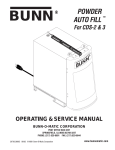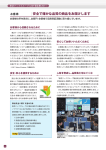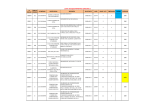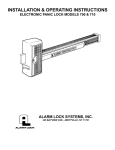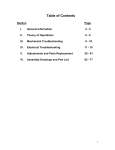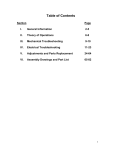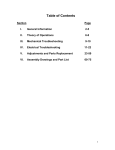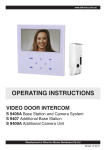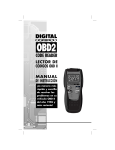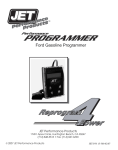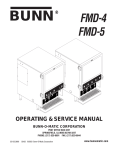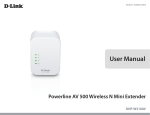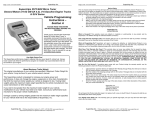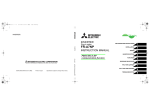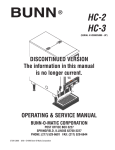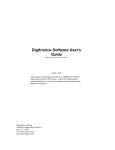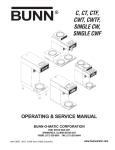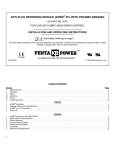Download 41087.0001
Transcript
POWDER AUTO FILL For ULTRA-2 SERVICE & REPAIR MANUAL BUNN-O-MATIC CORPORATION POST OFFICE BOX 3227 SPRINGFIELD, ILLINOIS 62708-3227 PHONE: (217) 529-6601 FAX: (217) 529-6644 41087.0001A 06/12 ©2012 Bunn-O-Matic Corporation BUNN-O-MATIC COMMERCIAL PRODUCT WARRANTY Bunn-O-Matic Corp. (“BUNN”) warrants equipment manufactured by it as follows: 1) Airpots, thermal carafes, decanters, GPR servers, iced tea/coffee dispensers, MCP/MCA pod brewers thermal servers and Thermofresh servers (mechanical and digital)- 1 year parts and 1 year labor. 2) All other equipment - 2 years parts and 1 year labor plus added warranties as specified below: a) Electronic circuit and/or control boards - parts and labor for 3 years. b) Compressors on refrigeration equipment - 5 years parts and 1 year labor. c) Grinding burrs on coffee grinding equipment to grind coffee to meet original factory screen sieve analysis - parts and labor for 4 years or 40,000 pounds of coffee, whichever comes first. These warranty periods run from the date of installation BUNN warrants that the equipment manufactured by it will be commercially free of defects in material and workmanship existing at the time of manufacture and appearing within the applicable warranty period. This warranty does not apply to any equipment, component or part that was not manufactured by BUNN or that, in BUNN’s judgment, has been affected by misuse, neglect, alteration, improper installation or operation, improper maintenance or repair, non periodic cleaning and descaling, equipment failures related to poor water quality, damage or casualty. In addition, the warranty does not apply to replacement of items subject to normal use including but not limited to user replaceable parts such as seals and gaskets. This warranty is conditioned on the Buyer 1) giving BUNN prompt notice of any claim to be made under this warranty by telephone at (217) 529-6601 or by writing to Post Office Box 3227, Springfield, Illinois 62708-3227; 2) if requested by BUNN, shipping the defective equipment prepaid to an authorized BUNN service location; and 3) receiving prior authorization from BUNN that the defective equipment is under warranty. THE FOREGOING WARRANTY IS EXCLUSIVE AND IS IN LIEU OF ANY OTHER WARRANTY, WRITTEN OR ORAL, EXPRESS OR IMPLIED, INCLUDING, BUT NOT LIMITED TO, ANY IMPLIED WARRANTY OF EITHER MERCHANTABILITY OR FITNESS FOR A PARTICULAR PURPOSE. The agents, dealers or employees of BUNN are not authorized to make modifications to this warranty or to make additional warranties that are binding on BUNN. Accordingly, statements by such individuals, whether oral or written, do not constitute warranties and should not be relied upon. If BUNN determines in its sole discretion that the equipment does not conform to the warranty, BUNN, at its exclusive option while the equipment is under warranty, shall either 1) provide at no charge replacement parts and/or labor (during the applicable parts and labor warranty periods specified above) to repair the defective components, provided that this repair is done by a BUNN Authorized Service Representative; or 2) shall replace the equipment or refund the purchase price for the equipment. THE BUYER’S REMEDY AGAINST BUNN FOR THE BREACH OF ANY OBLIGATION ARISING OUT OF THE SALE OF THIS EQUIPMENT, WHETHER DERIVED FROM WARRANTY OR OTHERWISE, SHALL BE LIMITED, AT BUNN’S SOLE OPTION AS SPECIFIED HEREIN, TO REPAIR, REPLACEMENT OR REFUND. In no event shall BUNN be liable for any other damage or loss, including, but not limited to, lost profits, lost sales, loss of use of equipment, claims of Buyer’s customers, cost of capital, cost of down time, cost of substitute equipment, facilities or services, or any other special, incidental or consequential damages. 392, AutoPOD, AXIOM, BrewLOGIC, BrewMETER, Brew Better Not Bitter, BrewWISE, BrewWIZARD, BUNN Espress, BUNN Family Gourmet, BUNN Gourmet, BUNN Pour-O-Matic, BUNN, BUNN with the stylized red line, BUNNlink, Bunn-OMatic, Bunn-O-Matic, BUNNserve, BUNNSERVE with the stylized wrench design, Cool Froth, DBC, Dr. Brew stylized Dr. design, Dual, Easy Pour, EasyClear, EasyGard, FlavorGard, Gourmet Ice, Gourmet Juice, High Intensity, iMIX, Infusion Series, Intellisteam, My Café, Phase Brew, PowerLogic, Quality Beverage Equipment Worldwide, Respect Earth, Respect Earth with the stylized leaf and coffee cherry design, Safety-Fresh, savemycoffee.com, Scale-Pro, Silver Series, Single, Smart Funnel, Smart Hopper, SmartWAVE, Soft Heat, SplashGard, The Mark of Quality in Beverage Equipment Worldwide, ThermoFresh, Titan, trifecta, Velocity Brew, A Partner You Can Count On, Air Brew, Air Infusion, Beverage Bar Creator, Beverage Profit Calculator, Brew better, not bitter., BUNNSource, Coffee At Its Best, Cyclonic Heating System, Daypart, Digital Brewer Control, Nothing Brews Like a BUNN, Pouring Profits, Signature Series, Tea At Its Best, The Horizontal Red Line, Ultra are either trademarks or registered trademarks of Bunn-O-Matic Corporation. 2 41087.1 030912 CONTENTS User Notices...............................................................................................................................3 Operating Instructions................................................................................................................4 Adjustments................................................................................................................................5 Preventive Maintenance Cleaning......................................................................................................................................6 Fault List.....................................................................................................................................7 Troubleshooting..........................................................................................................................8 Service.....................................................................................................................................12 Auger Drive Components..........................................................................................................13 Auger Motor..............................................................................................................................14 Frother and Mixing/Whipper Chamber......................................................................................15 Whipper Motor..........................................................................................................................16 Control Board and Level Probes................................................................................................18 TEST/SERVICE Switch..............................................................................................................21 Main Power ON/OFF Switch......................................................................................................22 Door Panel Assembly Lamp Cord Assembly..........................................................................................................23 Lamp Cord Connector.........................................................................................................24 Lamp Holder/Socket...........................................................................................................25 LED Door Lights..................................................................................................................26 Transformer..............................................................................................................................27 Potentiometer...........................................................................................................................28 Hopper Level Indicator..............................................................................................................29 Hopper Switch..........................................................................................................................30 Door Switch..............................................................................................................................31 Pressure Regulator and Needle Valve.......................................................................................32 Dispense Solenoid....................................................................................................................33 Wiring Diagrams.......................................................................................................................34 USER NOTICES All notices on the equipment are written for your protection. All notices are to be kept in good condition. Replace any unreadable or damaged labels. 3 41087.1 060112 OPERATING INSTRUCTIONS 8. If the Powder Auto-Fill fails to fill the ULTRA hopper in 5 minutes, the following will occur: a) The Powder Auto-Fill will stop dispensing product. b) The door lamp will flash 4 times about every 2 seconds. 9. After checking the ULTRA and Powder Auto-Fill set-up, the 5 minute refill fault may be cleared by simply opening and closing the Powder Auto-Fill door. 10. Once the product level in the ULTRA covers the auger, make the following switch settings at the ULTRA control panel: a) AUGER - “1”. b) ICE/OFF/CHILL - “ICE” or “CHILL” as appropriate for the granita product. 11. From this point onward, the Powder Auto-Fill will continue to automatically refill the ULTRA hopper, maintaining the ULTRA product at an approximate 2 gallon level. 12. When the Powder Auto-Fill powder level falls low, the door lamp will cycle ON and OFF, but will continue to dispense product for a preset period. When this period expires, the Powder Auto-Fill will continue to cycle the door lamp ON and OFF and will stop dispensing product. 13. To clear the low product fault, simply refill the powder as follows: a) Open the Powder Auto-Fill door. b) Close the hopper slide gate. c) Remove the product hopper. d) Refill the product hopper with powdered granita mix. e) Replace the hopper. f) Push the slide gate on the hopper ejector elbow to the OPEN position. g) Close the Powder Auto-Fill door. 1. On the Ultra touch pad, make the following settings: a) POWER- “ON” b) DAY/NIGHT- “DAY” 2. Pull the Powder Auto-Fill fully forward on its support rails and open the door. 3. Fill the Powder Auto-Fill product hopper as follows: a) Pull the slide gate closed on the Powder Auto-Fill product hopper elbow and remove the hopper from the Powder Auto-Fill. b) Remove the lid from the product hopper and fill the hopper with a powdered granita mix. c) Install the product hopper into the Powder AutoFill. Insure hopper is fully seated behind retainer plates. d) Push the slide gate on the hopper ejector elbow to the open position. 4. Place the ON/OFF switch at the Powder Auto-Fill whipper panel to “ON”. 5. After allowing 5 seconds for the Powder Auto-Fill to initialize, observe the door lamp. The door lamp should not be lit. If the door lamp is lit, consult the fault list located on the decal placed on the back of the door. Clear the fault before proceeding. NOTE: If the Powder Auto-Fill is being used for the first time with the selected granita mix, perform an adjustment as described in ADJUSTMENTS. 6. Close the Powder Auto-Fill door and observe the following: a) The door lamp lights steadily. b) The Powder Auto-Fill begins dispensing liquid granita product. 7. The Powder Auto-Fill will continue to fill the ULTRA product hopper until the liquid level in the ULTRA hopper reaches the product level probe or for 5 minutes, which ever occurs first. 4 41087.1 060112 ADJUSTMENTS When using the Powder Auto-Fill with a new powdered granita mix, follow the procedure outlined below to adjust the Powder Auto-Fill to produce the correct recipe. 1. Determine the mix ratio of powdered granita mix. Convert the recipe so that it is expressed in terms of weight units [grams (g), dry ounces (oz), or pounds (lbs)] of powdered granita mix to fluid ounces (fl. oz.) of water [1 gallon (gal) = 128 fl.oz.; 1 liter (l) = 33.8 fl.oz.]. 2. The delivery rate of the water ingredient is factory preset to 1 fl.oz. per second. Therefore, it is only necessary to adjust the delivery rate of the powdered granita mix. Adjustment is accomplished as follows: a) Place the Powder Auto-Fill on top of a fully assembled ULTRA taking care to align the Powder Auto-Fill guide rails over the rollers on the platform guide rails. b) Connect the Powder Auto-Fill power cord to the outlet located on the ULTRA auger motor cover. c) Attach a flexible water line to the .25” flare fitting on the back panel of the Powder Auto-Fill. i) Remove the hole plug on the whipper panel. Using a screwdriver, set potentiometer to approximately mid range. j) Remove the mixing chamber from the Powder Auto-Fill and place a small container, such as a cup, under the product hopper ejector elbow. k) Push the slide gate on the product hopper ejector elbow to the OPEN position. l) Momentarily set the TEST/SERVICE switch on the whipper panel to the TEST position. m) The hopper motor will run and dispense powdered granita mix for 10 seconds. n) After the Powder Auto-Fill has finished the 10 second throw test, weigh the dispensed product. o) Determine the dispense rate of the powdered product (weight units per second) by dividing the measured weight by 10. p) Compare the measured dispense rate with the mix ratio in step 1. q) Adjust the MIN/MAX control clockwise to increase the dispense rate or counterclockwise to decrease the dispense rate of the powdered granita mix. r) Repeat steps l through q as necessary until proper mix ratio is achieved. s) Replace the mixing chamber removed in step j. Replace hole plug. 3. Once the mix ratio has been adjusted, the Powder Auto-Fill can be run with the door open to allow the user to catch dispensed product for brix testing as follows: a) Hold a container under the dispense tip of the Powder Auto-Fill. b) Hold the TEST/SERVICE switch on the whipper panel to the SERVICE position. c) When the container is filled to the desired level, release the TEST/SERVICE switch. d) Measure the brix using the appropriate measuring device. e) Remove the hole plug. Using a screwdriver, adjust the potentiometer clockwise to increase the brix or counterclockwise to decrease the brix of the product. Replace the hole plug. NOTE: A water strainer assembly (BUNN-O-MATIC #23820.1000) should be installed in line prior to the flexible water line. d) On the ULTRA touch pad, make the following settings: i) POWER- “ON” ii) DAY/NIGHT- “DAY” e) Pull the Powder Auto-Fill fully forward on its support rails f) Fill the Powder Auto-Fill product hopper as follows: i) Pull the slide gate closed on the Powder AutoFill product hopper elbow and remove the product hopper from the Powder Auto-Fill. ii) Remove the lid from the product hopper and fill the hopper with a powdered granita mix. iii) Install the product hopper into the Powder Auto-Fill. g) Place the ON/OFF switch at the Powder Auto-Fill whipper panel to “ON”. h) After allowing 5 seconds for the Powder Auto-Fill to initialize, observe the door lamp on the whipper panel. The door lamp should not be lit. If the door lamp is lit, consult the fault list and clear the fault before proceeding. 5 41087.1 060112 CLEANING RECOMMENDED DAILY CLEANING AND MAINTENANCE TIPS This should be done in conjunction with the recommended weekly cleaning of your ULTRA-2 machine. Removing and cleaning the whipper chamber (once a day): 1. Open the cabinet door. 2. Pull the mixing chamber out of the whipper chamber. 3. Twist the whipper chamber clockwise and pull it off the whipper chamber receptacle. 4. Pull the frother off the motor shaft. Notice the flat keyway on the shaft and the matching keyway inside the frother. It is important that these two keyways are lined up when reassembling. 5. Twist the whipper chamber receptacle clockwise and pull it off the motor shaft. 6. Slip the O-ring off the whipper chamber receptacle. 7. Wash components in a mild solution of dish detergent using a bristle brush. 8. Rinse thoroughly and allow to dry before reinstalling in the machine. Mixing Chamber Whipper Chamber Receptacle O-ring Frother Dispense Tip Whipper Chamber Thorough cleaning of the hopper (once a week): Wiper Blade Shaft Wiper Blade 1. Open the cabinet door. 2. Remove the hopper/base assembly from the cabinet, remove the cover and empty the contents. 3. Pull the ejector elbow off the hopper base; remove the slide gate from the ejector elbow. 4. Remove the wiper blade and drive gear by removing the retaining ring from the wiper blade shaft. 5. Remove the auger by pulling it out of the front hopper base. 6. Remove the auger drive shaft by unscrewing the drive bracket from the auger drive shaft. 7. Wash components in a mild solution of dish detergent using a bristle brush when needed. 8. Rinse and dry each item thoroughly before reassembling. Wiper Drive Gear Spacer Hopper Base Auger Drive Shaft Auger Drive Bracket Retaining Ring Auger Ejector Elbow Slide Gate NOTICE The cleaning instructions noted above are for nondairy sugar based food products. When dispensing any other food product, the cleaning cycle for the whipping chamber assembly and ejector elbow must be performed daily. 6 41087.1 060112 FAULT LIST Door Lamp Fault ON Normal operation - Powder Auto-Fill ready to dispense Flashes ON/OFF at 50% duty cycle Low product level in Powder Auto-Fill hopper Two flashes about every 2 seconds ULTRA/Powder Auto-Fill probe circuit open Three flashes about every 2 seconds Powder Auto-Fill hopper not in place Four flashes about every 2 seconds ULTRA refill exceeded 5 minutes OFF Door not closed REQUIRED REGULAR MAINTENANCE: Semi Annual: Bunn Kit #45319.0000 is required to perform the semi annual Preventive maintenance: Note: Service caused by failure to perform required maintenance is not covered by warranty. Kit Contents Inventory this kit for completeness before proceeding. Part Number Qty. Description 25736.0000 1 Dispense Tip 25734.0000 1 Whipping Chamber 24733.0001 1 Mixing Chamber 28866.0000 1 Receptacle 26356.0000 1 Shaft Seal 24733.0010 1 O-Ring 25902.0000 1 Frother 25903.0001 1 Ejector Elbow 7 41087.1 060112 TROUBLESHOOTING A troubleshooting guide is provided to suggest probable causes and remedies for the most likely problems encountered. If the problem remains after exhausting the troubleshooting steps, contact the Bunn-O-Matic Technical Service Department. • • • • • • • Inspection, testing, and repair of electrical equipment should be performed only by qualified service personnel. All electronic components have 120 volt ac and low voltage dc potential on their terminals. Shorting of terminals or the application of external voltages may result in board failure. Intermittent operation of electronic circuit boards is unlikely. Board failure will normally be permanent. If an intermittent condition is encountered, the cause will likely be a switch contact or a loose connection at a terminal or crimp. Solenoid removal requires interrupting the water supply to the valve. Damage may result if solenoids are energized for more than ten minutes without a supply of water. The use of two wrenches is recommended whenever plumbing fittings are tightened or loosened. This will help to avoid twists and kinks in the tubing. Make certain that all plumbing connections are sealed and electrical connections tight and isolated. Keep away from combustibles. WARNING – • • • • Exercise extreme caution when servicing electrical equipment. Unplug the dispenser when servicing, except when electrical tests are specified. Follow recommended service procedures Replace all protective shields or safety notices PROBLEM PROBABLE CAUSE ULTRA and Powder Auto-Fill do not run - Main power on ULTRA is OFF 1. ULTRA power cord disconnected Check that the power cord is conor main power switch in ON posi- nected to proper electrical source and that the ULTRA main power switch tion. is in the ON position. REMEDY Product level in ULTRA is lower than 1. The ULTRA DAY/NIGHT setting is level Probe - ULTRA running; Powder in the NIGHT mode. Auto-Fill door lamp is OFF 2. Powder Auto-Fill power cord disconnected. 1. The ULTRA DAY/NIGHT setting should be in the DAY mode. 3. Powder Auto-Fill main power switch in OFF position. 3. Select the ON position of the main power switch. 5. Powder Auto-Fill door is open. 5. The Powder Auto-Fill door should be closed securely. Product level in ULTRA is lower than level Probe - ULTRA running; Powder Auto-Fill door lamp flashes ON and OFF 2. Check that the Powder Auto-Fill is plugged into the top of the ULTRA auger motor cover. 1. Low product in Powder Auto- Remove hopper and fill with powdered mix. Fill. 8 41087.1 060112 TROUBLESHOOTING (cont.) PROBLEM PROBABLE CAUSE Product level in ULTRA is lower 1. Powder Auto-Fill not pulled comthan level Probe - ULTRA running; pletely forward. Powder Auto-Fill door lamp flashes two times 2. ULTRA level probe misaligned. REMEDY 1. Check that the Powder Auto-Fill is pulled completely forward until the guide rails roll into the indented position. 2. Position the ULTRA level probe so that it is located in the notch of the ULTRA hopper and touching the contact protruding from the front of the PAF platform. Product level in ULTRA is lower 1. Powder Auto-Fill hopper not inthan level Probe - ULTRA running; stalled properly. Powder Auto-Fill door lamp flashes three times 1. Properly position the Powder Auto-Fill hopper. Product level in ULTRA is lower 1. Refill time exceeded five minthan level Probe - ULTRA running; utes. Powder Auto-Fill door lamp flashes four times Check that the SERVICE switch is released or reset by opening and closing the Powder Auto-Fill door. The ULTRA product tastes “watery” or “sugary” 1. Improper adjustment of product mix ratio. Adjust the product mix ratio per instructions in Powder Auto-Fill Adjustment. See page 5. Powder Auto-Fill dispenses dry 1. Powder Auto-Fill not connected product only - dry powder build-up to water source. in mixing and whipper chambers 1. Connect the Powder Auto-Fill to a 20 to 90 psi (138 to 620 kPa)water source. . 2. Water source turned off. 2. Turn water source on. 3. Water line obstructed. 3. Remove obstruction. 9 41087.1 060112 TROUBLESHOOTING (cont.) PROBLEM PROBABLE CAUSE Powder Auto-Fill will not dispense 1. No water product REMEDY Water lines and valves to the dispenser must be open and free of obstructions. 2. No power or incorrect voltage to the dispenser. Check that the power cord is connected to the ULTRA dispenser and for voltage from the ULTRA dispenser. 3. Dispense Solenoid Valve Refer to Service- Dispense Solenoid Valve for testing procedures. See page 32 4. Control Board and Probe Refer to Service- Control Board and Probe for testing procedures. See page 18 5. Auger Drive Refer to Service- Auger Drive for testing procedures. See page 13 6. Transformer Refer to Service- Transformer for testing procedures. See page 26 7. Water Strainer (Optional) A) Direction of flow arrow must be pointing towards dispenser. B) Remove the strainer and check for obstructions. Clear or replace. Dripping from dispense tip 1. Dispense Solenoid Valve Remove dispense valve and clear any obstructions. Rebuild or replace the valve if necessary. See page 32 Water flows continuously 1. Control Board and Probe Refer to Service- Control Board and Probe for testing procedures. See page 18 2. Dispense Solenoid Valve Refer to Service- Dispense Solenoid Valve for testing procedures. See page 32 10 41087.1 060112 TROUBLESHOOTING (cont.) PROBLEM Product overflows ULTRA hopper Weak product Dispenser is making unusual noises PROBABLE CAUSE REMEDY 1. Control Board and Probe Refer to Service- Control Board and Probe for testing procedures. See page 18 2. Dispense Solenoid Valve Refer to Service- Dispense Solenoid Valve for testing procedures. See page 32 1. Whipper Motor Refer to Service- Whipper Motor for testing procedures. See page 16 2. Frother Refer to Service- Frother for testing procedures. See page 15 3. Dispense Solenoid Valve Refer to Service- Dispense Solenoid Valve for testing procedures. See page 32 4. Auger Drive Refer to Service- Auger Drive for testing procedures. See page 13 5. Auger Spring Refer to Service- Auger Spring for testing procedures. See page 13 6. Auger Motor Refer to Service- Auger Motor for testing procedures. See page 14 7. Improper adjustment of product mix ratio Set the product mix ratio per Adjustments. See page 5 1. Plumbing lines Plumbing lines should not be resting on the counter top. 2. Water supply A) The dispenser must be connected to a cold water line. B) Water pressure to the dispenser must not exceed 90 psi (620 kPa). Install a regulator if necessary to lower the working pressure to approximately 50 psi (345 kPa). Display not lit 1. Lamp Refer to Service- Lamp for testing procedures. See page 25 2. Lamp Holder Refer to Service- Lamp Holder for testing procedures. See page 25 11 41087.1 060112 SERVICE This section provides procedures for testing and replacing various major components used in this dispenser should service become necessary. Refer to Troubleshooting for assistance in determining the cause of any problem. WARNING - Inspection, testing, and repair of electrical equipment should be performed only by qualified service personnel. The dispenser should be unplugged when servicing, except when electrical tests are required and the test procedure specifically states to plug-in the dispenser. COMPONENT ACCESS WARNING - Disconnect the dispenser from the power source before the removal of any panel or the replacement of any component. All components are accessible by opening the door, removal of the door panel, removal of the dispenser rear panel, hopper, hopper support plate and top wraparound cover. Refer to Fig. 1 P1891 FIG. 1 COMPONENT LOCATIONS 12 41087.1 060112 SERVICE (cont.) AUGER DRIVE COMPONENTS 12. Rinse and dry each item thoroughly. 13. Check for damaged or broken components, replace any if necessary and reassemble hopper assembly. 14. Install hopper assembly in the dispenser by sliding hopper assy on the hopper support plate (12) until the hopper base (9) seats firmly behind the retainer plates (16) on the hopper support plate (12). 1 2 3 4 5 FIG. 2 AUGER DRIVE COMPONENTS P1922 Location The auger drive components are located in the bottom of the hopper assembly. Removal, Cleaning and Replacement 1. Open the dispenser door. 2. Lift the hopper assembly over the retainer plates (16) on hopper support plate (12) and slide hopper assembly out the front of the dispenser. 3. Remove hopper lid (1) and empty product. 4. Pull off the ejector elbow (15) and remove the slide gate (21). 5. Remove retainer ring (11) and washer (10) from the bottom of the hopper base (9). 6. Remove wiper shaft (3), wiper blade (4) and wiper drive gear (5) from the hopper base (9). 7. Remove auger wire (14) by pulling it out the front of the hopper base (9). 8. Remove auger drive shaft (13) by removing the retaining clip (6) from auger drive shaft. 9. Slide spacer (8) and auger drive shaft bracket (7) off of the auger drive shaft (13). 10. Remove auger drive shaft (13) from hopper base (9). 11. Wash components in a mild solution of dish detergent using a bristle brush when needed. 7 13 8 9 10 11 17 14 20 15 21 18 19 16 12 P1894 FIG. 3 AUGER DRIVE & HOPPER ASSEMBLY 13. Auger Drive Shaft 1. Hopper Lid 14. Auger Wire 2. Hopper 15. Ejector Elbow 3. Wiper Shaft 16. Hopper Retainer Plates 4. Wiper Blade 5. Wiper Drive Gear 17. Auger Motor Bracket 7. Auger Drive Bracket 18. Auger Motor 19. Dust Seal 8. Spacer 20. Auger Motor Mounting 9. Hopper Base panel 10. Washer 21. Slide gate 11. Retainer Ring 12. Hopper Support Plate 13 41087.1 060112 SERVICE (cont.) AUGER DRIVE MOTOR Removal and Replacement: 1. Remove hopper assembly and set aside for reassembly. 2. Remove six #8-32 screws securing the rear cover and remove the rear cover. 3. Remove the four #8-32 screws located inside the dispenser housing on the lower right front of the auger motor mounting panel, securing the auger motor mounting bracket and auger motor to the rear of the auger motor mounting panel. 4 Disconnect the wires from the auger drive motor. 5. Remove the auger motor mounting bracket, auger motor and dust seal as an assembly. 6. Remove the dust seal from the auger motor and discard the motor. 7. Install dust seal on the new auger motor shaft and align the notch in the seal with the motor casting. 8. Connect the wires from the auger motor to the terminals in the main wiring harness. See Fig. 5. 9. Using four #8-32 screws, install the auger motor, dust seal and mounting bracket to the rear of the auger motor mounting panel. 10. Install the hopper assembly. 11. Install the rear cover with six #8-32 screws. P1922 FIG. 4 AUGER MOTOR Location: The auger motor is located on the right rear of the motor assembly mounting panel. Test procedures: 1. Disconnect the dispenser from the power source. 2. Check the voltage across the positive (red wire) terminal and the negative (black wire) terminal on the auger motor with a voltmeter. With the dispenser door open and the product level in the ULTRA hopper lower than the probe, press and hold the SERVICE switch. Connect the dispenser to the power supply. The indication must be 4.0 to 26.5 volts dc. If voltage is present as described, the auger motor drive is operating properly. If auger does not turn, replace the auger motor. If voltage is not present as described, refer to wiring diagrams and check wiring harness. RED to Control Board (J1-1) BLK to GRN Wire Main Harness to Control Board (J1-7) FIG. 5 AUGER MOTOR TERMINALS 14 P1902 41087.1 060112 SERVICE (cont.) FROTHER AND MIXING/WHIPPER CHAMBER FIG. 6 FROTHER AND MIXING/WHIPPER CHAMBER 10. Slide whipper chamber receptacle with seal (6) and O-ring (4) on to the motor shaft. 11. Rotate the receptacle with seal (6) counterclockwise until it snaps into place on the motor mounting nuts (7). 12. Push frother (5) onto the motor shaft, making sure the flat in the frother (5) lines up with the flat on the motor shaft. 13. Install whipper chamber (3) on the whipper chamber receptacle (6) by twisting counterclockwise until tabs on the whipper chamber (3) lock with the tabs on the whipper chamber receptacle (6). Be sure dispense port is pointing down. 14. Install dispense tip (2) into the bottom of the whipper chamber (3). 15. Slip the mixing chamber (1) onto the mixing chamber water inlet tube far enough so the mixing chamber (1) will seat inside the whipper chamber (3). 16. Install hopper assembly in the dispenser by sliding hopper firmly behind the retainer plates on the hopper support panel. P1923 Location: The frother is located behind the dispenser door, mounted on the front panel and inside the whipper chamber. Removal, Cleaning and Replacement: 1. Disconnect the dispenser from the power source. 2. Open the dispenser door and lift the front edge of the hopper over the retainer plates on the hopper support panel and slide the hopper assembly out the front of the dispenser. 3. Pull the mixing chamber (1) out of the whipper chamber (3). 4. Remove the dispense tip (2) and twist the whipper chamber (3) clockwise and pull it off the whipper chamber receptacle (6). 5. Pull the frother (5) off the motor shaft. Notice the flat side on the shaft and the matching flat inside the frother. It is important that these two flats are lined up when reassembling. 6. Slip the O-ring (4) off the whipper chamber receptacle (6). 7. Remove the receptacle by rotating clockwise until the receptacle clears the nuts (7) and slide off the motor shaft. 8. Wash components in a mild solution of dish detergent using a bristle brush. 9. Rinse thoroughly and allow to dry before reinstalling in the dispenser. 9 8 7 6 5 4 1 3 2 FIG. 7 MIXING/WHIPPER CHAMBER COMPONENTS 1. 2. 3. 4. 5. 15 Mixing Chamber Dispense Tip Whipper Chamber O-Ring Frother 6. 7. 8. 9. P1895 Receptacle w/Seal Nut Slinger Motor Assembly 41087.1 060112 SERVICE (cont.) WHIPPER MOTOR Removal and Replacement: 1. Disconnect the dispenser from the power source. 2. Open the dispenser door and remove the hopper assembly out the front of the dispenser. 3. Remove the four #8-32 screws securing the hopper support panel to the auger motor mounting panel and the whipper motor mounting panel. 4. Slowly lift the hopper support panel up and disconnect the red/black and green wires from the hopper switch. 5. Pull the mixing chamber out of the whipper chamber. 6. Twist the whipper chamber clockwise and pull it off the whipper chamber receptacle. 7. Pull the frother off the motor shaft. Notice the flat side on the shaft and the matching flat inside the frother. It is important that these two flats are lined up when reassembling. 8. Slide the receptacle with seal off of the motor shaft. P1924 FIG. 8 WHIPPER MOTOR NOTE: To remove the receptacle only, rotate clockwise until the receptacle clears the nuts and slide off of the motor shaft. Location: The whipper motor is located on the back side of the whipper motor mounting panel. 9. Slide the slinger off of the motor shaft. 10. Remove the two nuts securing the whipper chamber receptacle and whipper motor to the front panel. 11. Disconnect the black leads on the motor from the white/red and white/brown wires of the main wiring harness and remove the motor. 12. Install new motor on rear of front panel and secure with two nuts. Connect the black leads from the motor to the main wiring harness. Refer to Fig. 9 when reconnecting wires. Test Procedure: 1. Disconnect the dispenser from the power source. 2. Disconnect the white/red and white/brown wires of the main wiring harness from the black leads of the whipper motor. 3. With the ULTRA hopper level lower than the probe, press and hold the SERVICE switch and check the voltage across the disconnected harness wires with a voltmeter. Connect the dispenser to the power source. The indication must be: a) 120 volts ac for 120 volt models. b) 230 volts ac for 230 volt CE models. 4. Disconnect the dispenser from the power source. If voltage is present as described, replace the motor. If voltage is not present as described, refer to the wiring diagrams and check the dispenser wiring harness. 16 41087.1 060112 SERVICE (cont.) WHIPPER MOTOR (cont.) 21. Install dispense tip into the bottom of the whipper chamber. 22. Slip the mixing chamber onto the mixing chamber water inlet tube far enough so the mixing chamber will seat inside the whipper chamber. 23. Install hopper assembly in the dispenser by sliding hopper assembly on the hopper support panel until the slot in the bottom rear of the hopper seats against the pin and retainer plates on the hopper support panel. 13. Slide the slinger onto the motor shaft flush against the front panel. 14. Wash whipper chamber components in a mild solution of dish detergent using a bristle brush. 15. Rinse thoroughly and allow to dry before reinstalling in the dispenser. 16. Slide whipper chamber receptacle with seal and O-ring onto the motor shaft. 17. Rotate the receptacle with seal counterclockwise until it snaps into place on the motor mounting nuts. 18. Push frother onto the motor shaft, making sure the flat in the frother lines up with the flat on the motor shaft. 19. Connect the red/black and green wires to the hopper switch, Fig.10 and install the hopper support panel using the four #8-32 screws. 20. Install whipper chamber on the whipper chamber receptacle by twisting counterclockwise until tabs on the whipper chamber lock with the tabs on the whipper chamber receptacle. Be sure dispense port is pointing down. GRN to Control Boad (J1-8) RED/BLK to Control Board (J1-10) P1904 FIG. 10 HOPPER SWITCH TERMINALS BLK WHI/RED to Control Board (J7-2) WHI/BRN to Control Board (J7-4) P1903 FIG. 9 WHIPPER MOTOR TERMINALS 17 41087.1 060112 SERVICE (cont.) 8. Select the “OFF” position of the main power switch and disconnect the dispenser from the power source. CONTROL BOARD and LEVEL PROBE If voltage is present as described, proceed to #9. If voltage is not present as described refer to the wiring diagram and check the dispenser wiring harness. 9. Reconnect the four pin connector to the control board (J7). 10. Disconnect the twelve pin connector (J1) from the control board. 11. Measure the resistance between pins 8 & 12 of the twelve pin connector on the wiring harness using an ohmmeter. The indication must be between 298k ohms and 304k ohms. P1925 FIG. 11 CONTROL BOARD Location: The control board is located behind the rear panel, mounted on the back side of the hopper motor mounting panel. Test Procedure: Liquid Level Control 1. Disconnect the dispenser from the power source. 2. Disconnect the twelve pin connector (J1) from the control board. 3. Check the voltage across pins 2 & 3 of the twelve pin connector on the wiring harness with a voltmeter. Connect the dispenser to the power source and select the “ON” position of the main power switch. The indication must be 24 volts ac. 4. Select the “OFF” position of the main power switch and disconnect the dispenser from the power source. If voltage is present as described, proceed to #5. If voltage is not present as described, refer to the wiring diagram and check the dispenser wiring harness. 5. Reconnect the twelve pin connector to the control board (J1). 6. Disconnect the four pin connector (J7) from the control board. 7. Check the voltage across pins 1 & 3 of the four pin connector on the wiring harness with a voltmeter. Connect the dispenser to the power source and select the “ON” position of the main power switch. The indication must be: a) 120 volts ac for 120 volt models. b) 230 volts ac for 230 volt CE models. If the resistance measures as described, proceed to #12. If the resistance does not measure as described, refer to the wiring diagram and check the dispenser wiring harness. 12. Carefully connect a piece of insulated jumper wire to the level probe contact pin (pink wire) located at the lower left rear of the dispenser. 13. Check the voltage across the terminals, first of the dispense solenoid and then of the hopper motor with a voltmeter. Connect the dispenser to the power source and select the “ON” position of the main power switch. The indication must be: a) 120 volts ac for 120 volt models. b) 230 volts ac for 230 volt CE models. at the dispense solenoid and between 4 and 26 volts dc at the hopper motor after a delay of approximately 10 seconds. 14. Touch the free end of the jumper wire to the dispenser housing. The indication must be 0 (zero) after a delay of up to 5 seconds. 15. Move the jumper wire away from the housing. The indication must again be: a) 120 volts ac for 120 volt models. b) 230 volts ac for 230 volt CE models. at the dispense valve solenoid and between 4 and 26 volts dc at the hopper motor after a delay of up to 5 seconds. 16. Disconnect the dispenser from the power source, remove the jumper wire, and select the “OFF” position on the main power switch. If voltage is present as described, The liquid level control circuitry is operating properly. If voltage is not present as described, replace the control board. 18 41087.1 060112 SERVICE (cont.) If voltage is present as described, proceed to #12. If voltage is not present as described, replace the photo transistor. CONTROL BOARD and LEVEL PROBE (cont.) Test Procedure: Low Product Detect 1. Disconnect the dispenser from the power source. 2. Disconnect the twelve pin connector (J1) from the control board. 3. Check the voltage across pins 2 & 3 of the twelve pin connector on the wiring harness with a voltmeter. Connect the dispenser to the power source and select the “ON” position of the main power switch. The indication must be 24 volts ac. 4. Select the “OFF” position of the main power switch and disconnect the dispenser from the power source. 12. Check the voltage across pins 1 (positive) & 3 (negative) of the four pin connector on the control board with a voltmeter. Remove the hopper from the dispenser, connect the dispenser to the power source and select the “ON” position of the main power switch. Shine a flashlight on the photo transistor (left side panel). The indication must be less than 1 volt dc. 13. Disconnect the dispenser from the power source and select the “OFF” position on the main power switch. If voltage is present as described, proceed to #14. If voltage is not present as described, replace the photo transistor. If voltage is present as described, proceed to #5. If voltage is not present as described, refer to the wiring diagram and check the dispenser wiring harness. 14. Disconnect the two pin connector (J2) from the control board. 15. Check the voltage across pins 1 (positive) & 2 (negative) of the two pin connector on the control board with a voltmeter. Connect the dispenser to the power source and select the “ON” position of the main power switch. The indication must be +1.5 volts dc. 16. Select the “OFF” position of the main power switch and disconnect the dispenser from the power source. 5. Reconnect the twelve pin connector to the control board (J1). 6. Disconnect the four pin connector (J6) from the control board. 7. Check the voltage across pins 1 (positive) & 3 (negative) of the four pin connector on the control board with a voltmeter. Connect the dispenser to the power source and select the “ON” position of the main power switch. The indication must be +5 volts dc. 8. Select the “OFF” position of the main power switch and disconnect the dispenser from the power source. If voltage is present as described, proceed to #17. If voltage is not present as described, replace the control board. If voltage is present as described, proceed to #9. If voltage is not present as described, replace the control board. 17. Check the photo LED forward and reverse bias using a diode tester. The photo LED must be forward biased with positive applied to pin 1 of the two pin connector and negative applied to pin 2 of the two pin connector. The photo LED must be reverse biased with negative applied to pin 1 of the two pin connector and positive applied to pin 2 of the two in connector. 9. Reconnect the four pin connector to the control board (J6). 10. Check the voltage across pins 1 (positive) & 3 (negative) of the four pin connector on the control board with a voltmeter. Place a full hopper in the dispenser, connect the dispenser to the power source, select the “ON” position on the main power switch, and close the dispenser door. The indication must be +5 volts dc. 11. Disconnect the dispenser from the power source, remove the jumper wire, and select the “OFF” position on the main power switch. If the photo LED biasing checks as described, the low level detect circuitry is operating properly. If the photo LED biasing does not check as described, replace the photo LED. NOTE: The photo LED lights in the infrared spectrum and is not visible to the human eye. 19 41087.1 060112 SERVICE (cont.) CONTROL BOARD and LEVEL PROBE (cont.) Removal and Replacement: 1. Disconnect the dispenser from the power source. 2. Remove the two plugs (J1 and J7) from the main wiring harness, the potentiometer plug (J3), the photo transistor plug (J6), and the photo LED plug (J2) from the control board. 3. Remove the four #6-32 keps nuts securing the control board to the hopper motor mounting panel. 4. Remove the control board. 5. Remove the four spacers from the old control board and install them into the new control board. 6. Instal the new control board using the four #6-32 keps nuts. 7. Reconnect the two plugs (J1 and J7) from the main wiring harness, the potentiometer plug (J3), the photo transistor plug (J6), and the photo LED plug (J2) to the control board. Refer to Fig. 12. J7 J1 J3 J2 J6 P1905 FIG. 12 CONTROL BOARD WIRING 20 41087.1 060112 SERVICE (cont.) Removal and Replacement: 1. Disconnect the dispenser from the power source. 2. Open the dispenser door and remove the hopper assembly out the front of the dispenser. 3. Remove the four #8-32 screws securing the hopper support panel to the auger motor mounting panel and the whipper motor mounting panel. 4. Slowly lift the hopper support panel up and disconnect the red/black and green wires from the hopper switch. 5. Remove the facenut securing the TEST/SERVICE switch the whipper motor mounting panel. 6. Remove switch with wires attached from the back side of the whipper motor mounting panel. 7. Disconnect the wires from the switch and discard the switch. 8. Refer to Fig. 14 when connecting the wires to the new switch. 9. Install new switch with wires attached through the hole in the whipper mounting panel and secure with facenut. 10. Connect the red/black and green wires to the hopper switch. See Fig. 10 on page 17. 11. Install the hopper support panel to the auger motor mounting panel and the whipper motor mounting panel using the four #8-32 screws. 12. Install the hopper assembly. TEST/SERVICE SWITCH P1923 FIG. 13 TEST/SERVICE SWITCH Location: The TEST/SERVICE switch is located on the left front of the whipper motor mounting panel. Test Procedure: 1. Disconnect the dispenser from the power source. 2. Disconnect the wires from the switch terminals. 3. Check for continuity between the center terminal and upper terminal with switch in the SERVICE position (lower). Check for continuity between the center terminal and the lower terminal with the switch in the TEST position (upper). Continuity must not be present when the switch is in the center position. WHI/ORN from Control Board J1-6 GRN from Control Board J1-8 BLU/BLK from Control Board J1-11 If continuity is present as described, the switch is operating properly. If continuity is not present as described, replace the switch. FIG. 14 TEST/SERVICE SWITCH TERMINALS 21 P1906 41087.1 060112 SERVICE (cont.) MAIN POWER ON/OFF SWITCH Removal and Replacement: 1. Disconnect the dispenser from the power source. 2. Open the dispenser door and remove the hopper assembly out the front of the dispenser. 3. Remove the four #8-32 screws securing the hopper support panel to the auger motor mounting panel and the whipper motor mounting panel. 4. Slowly lift the hopper support panel up and disconnect the red/black and green wires from the hopper switch. 5. Remove the switch mounting nut on the front of the whipper motor mounting panel. 6. Remove switch with wires attached from the rear of the whipper motor mounting panel. 7. Remove the wires from the switch terminals and discard switch. 8. Connect the wires to the new switch, refer to Fig. 16. 9. Push new switch through hole in the whipper motor mounting panel and secure with face nut. 10. Connect the red/black and green wires to the hopper switch. See Fig. 10 on page 17. 11. Install the hopper support panel to the auger motor mounting panel and the whipper motor mounting panel using the four #8-32 screws. 12. Install the hopper assembly. P1923 FIG. 15 MAIN POWER ON/OFF SWITCH Location: The main power switch is located inside the dispenser on the right of the whipper motor mounting panel. BLK from Power Cord BLK from Main Harness Test Procedure: 1. Disconnect the dispenser from the power source. 2. Disconnect the black wires from the main wiring harness. 3. With the switch in the ON (lower) position check for continuity between the center and the upper terminal. With the switch in the OFF (upper) position no continuity should be present between center and upper terminals. FIG. 16 MAIN POWER ON/OFF SWITCH TERMINALS If continuity is present as described, the main power switch is operating properly. If continuity is not present as described, replace the switch. 22 P1907 41087.1 060112 SERVICE (cont.) LAMP CORD ASSEMBLY Removal and Replacement: 1. Disconnect the lamp cord assembly from the lamp cord connector assembly in the top of the dispenser. 2. Open the dispenser door and remove the five screws securing the rear cover to the door. 3. Disconnect the lamp cord assembly from the lamp holder/socket assembly and set the rear panel aside. 4. Cut the terminals off of the lamp cord assembly. 5. Remove lamp cord assembly from the door assembly and discard. 6. Push new lamp cord wires through the holes on the top of the door assembly. 7. Strip the wires from the new lamp cord approximately .281”. 8. Using the two terminals supplied, crimp the new terminals to the lamp cord assembly and connect them to the lamp holder/socket assembly wires. 9. Reinstall the rear panel to the door assembly. 10. Close the door. 11. Plug-in the new lamp cord assembly to the lamp cord connector assembly on top of the dispenser. 12. Refer to Fig. 18 when reconnecting the wires. P1891 FIG. 17 LAMP CORD ASSY Location: The lamp cord assembly is located in the top of the dispenser. Test Procedures: 1. Disconnect the dispenser from the power source. 2. Unplug the lamp cord assembly from lamp cord connector assembly. 3. Check for continuity across the tip of the cord assembly and the housing. Continuity must not be present when the lamp is removed. If continuity is present as described, the cord assembly is operating properly. If continuity is not present as described, replace the cord assembly. BLK to WHI at Lamp Holder or RED at LED Harness BLK to BLK at Lamp Holder or BLK at LED Harness P1926 FIG. 18 LAMP CORD WIRES 23 41087.1 060112 SERVICE (cont.) LAMP CORD CONNECTOR If continuity is present as described, the lamp cord connector is operating properly. If continuity is not present as described, replace the lamp cord connector. P1923 FIG. 19 LAMP CORD CONNECTOR Location: The lamp cord connector is located on top of the dispenser. Test Procedures: 1. Disconnect the dispenser from the power source. 2. Disconnect the lamp cord from the lamp cord connector. 3. Disconnect the plug on the dispenser main harness from the connector from the lamp cord connector. 4. Check the voltage across the two pin holes on the main harness plug with a voltmeter and Day/Night switch in the “DAY” position and the “ON/OFF” switch in the “ON” position. Verify that the dispenser hopper is full and in place, the platform probe contact is making contact with the ULTRA liquid level probe, and the dispenser door is closed. Connect the dispenser to the power source. The indication must be approximately 12.6 volts ac. 5. Disconnect the dispenser from the power source. If voltage is present as described, proceed to #6. If voltage is not present as described, refer to the wiring diagram and check the dispenser main wiring harness. 6. Check for continuity between pin 1 (red) of the lamp cord connector and the center terminal of the lamp cord connector. Check for continuity between pin 2 (black) of the lamp cord connector plug and the lamp cord connector body. Check for continuity between pins 1 & 2 of the lamp cord connector plug. Continuity must not be present between pins 1 & 2. 24 Removal and Replacement: 1. Disconnect the lamp cord assembly from the lamp cord connector. 2. Remove the six #8-32 screws securing the rear cover to the dispenser. 3. Disconnect the lamp cord connector wires from the dispenser main wiring harness. 4. Remove nut and washer securing the lamp cord connector to the dispenser. Remove and set aside the insulating washers and discard nut, washer and lamp cord connector. 5. Remove new nut and washer from new lamp cord connector. 6. Install the insulating washers to the hole in the top of the dispenser. Push new lamp cord connector through the holes in the insulating washers and secure with the new nut and washer. 7. Reconnect the wires on the cord connector to the dispenser main wiring harness. 8. Connect the lamp cord to the lamp cord connector. 9. Install the rear cover to the dispenser and secure with six #8-32 screws. To Main Harness P1928 FIG. 20 LAMP CORD CONNECTOR 41087.1 060112 SERVICE (cont.) If continuity is present as described, the lamp is operating properly. If continuity is not present as described, replace the lamp. LAMP HOLDER/SOCKET ASSEMBLY Removal and Replacement: 1. Disconnect the lamp cord assembly from the lamp cord connector assembly in the top of the dispenser. 2. Remove the display graphic from the dispenser door. 3. Open the dispenser door. 4. Remove the five #6-32 screws securing the rear door cover to the door. 5. Carefully lower the rear door cover and disconnect the lamp holder/socket assembly from the lamp cord terminals. 6. Remove the lamp. 7. Remove #2-56 screw and elastic lock nut securing the lamp holder/socket assembly to the mounting bracket. Remove the lamp holder/socket assembly and discard. 8. Install new lamp holder/socket assembly on mounting bracket using the #2-56 screw and lock nut. 9. Reinstall lamp. 10. Connect the new lamp holder/socket assembly to the lamp cord terminals. 11. Reinstall the rear door cover to the dispenser door. Make sure wires are located in notch in door flange. 12. Close the dispenser door. 13. Plug-in the lamp cord assembly to the lamp cord connector assembly on top of the dispenser. 14. Refer to Fig. 22 when reconnecting the wires. P1927 FIG. 21 LAMP HOLDER/SOCKET ASSEMBLY Location: The lamp holder/socket assembly is located inside the dispenser door. Test Procedures: 1. Disconnect the lamp cord from the lamp cord connector. 2. Remove the lamp from the lamp holder/socket assembly. 3. Check the voltage across the two pin holes on the lamp holder/socket assembly with a voltmeter and Day/Night switch in the “DAY” position and the ON/OFF switch in the “ON” position. Verify that the dispenser hopper is full and in place, the dispenser probe contact is making contact with the ULTRA liquid level probe, and the dispenser door is closed. Reconnect the lamp cord to the lamp cord connector. The indication must be approximately 12.6 volts ac. 4. Disconnect the lamp cord from the lamp cord connector. If voltage is present as described, the lamp holder/ socket assembly is operating properly. If voltage is not present as described, replace the lamp holder/socket assembly 5. Check for continuity across the terminals on the lamps. BLK to BLK at Lamp Cord P1929 FIG. 22 LAMP HOLDER/SOCKET ASSEMBLY WIRES 25 41087.1 060112 SERVICE (cont.) OPTIONAL LED DOOR LIGHTS 5. Check for continuity across the terminals on the leads and the LED harness. If continuity is present as described, the lamp is operating properly. If continuity is not present as described, replace the lamp. Removal and Replacement: 1. Disconnect the lamp cord assembly from the lamp cord connector assembly in the top of the dispenser. 2. Remove the display graphic from the dispenser door. 3. Open the dispenser door. 4. Remove the five #6-32 screws securing the rear door cover to the door. 5. Carefully lower the rear door cover and disconnect the LED board leads from the lamp cord terminals. 6. Remove and discard the faulty LED board. 7. Install a new LED board exposing the adhesive backing. 8. Refer to Fig. 24 and reconnect wires to the LED board. 9. Connect the leads to the lamp cord assembly and replace the rear door cover. 10. Close the dispenser door. 11. Plug-in the lamp cord assembly to the lamp cord connector assembly on top of the dispenser. P4110 FIG. 23 LED DOOR LIGHTS Location: The LED door lights are located inside the dispenser door. Test Procedures: 1. Disconnect the lamp cord from the lamp cord connector. 2. Disconnect the black and red leads from the LEDs. 3. Check the voltage across the two leads with a voltmeter and Day/Night switch in the “DAY” position and the ON/OFF switch in the “ON” position. Verify that the dispenser hopper is full and in place, the dispenser probe contact is making contact with the ULTRA liquid level probe, and the dispenser door is closed. Reconnect the lamp cord to the lamp cord connector. The indication must be approximately 12 volts ac. 4. Disconnect the lamp cord from the lamp cord connector. to BLK at Lamp Cord If voltage is present as described, the LED board is faulty. If voltage is not present as described, retrace the wiring circuit to find the fault. FIG. 24 LED DOOR LIGHT WIRING 26 P4111 41087.1 060112 SERVICE (cont.) TRANSFORMER 5. Check the voltage between J1-2 and J1-3 on the twelve pin connector at the control board. Connect the dispenser to the power source. The indication must be 24 volts ac. If voltage is present as described, the transformer is operating properly. If voltage is not present as described, replace the transformer. Removal and Replacement: 1. Remove the hopper from the dispenser. 2. Remove the four #8-32 screws securing the hopper support panel to the dispenser. 3. Disconnect the red/black and green wires from the hopper switch and set the hopper support panel aside. 4. Disconnect the transformer four pin connector from the four pin plug on the main wiring harness. 5. Remove the two #6-32 keps nuts securing the transformer to the dispenser base. Remove and discard the transformer. 6. Install the new transformer on the dispenser base and secure with two #6-32 keps nuts. 7. Connect the four pin connector on the transformer to the four pin plug on the main wiring harness. 8. Reconnect the red/black and green wires to the hopper switch. See Fig. 10 on page 17. 9. Install the hopper support panel and secure with four #8-32 screws. 10. Install the hopper assembly. P1930 FIG. 25 TRANSFORMER Location: The transformer is located under the hopper support panel mounted to the left of the whipper motor. Test Procedures: 1. Disconnect the dispenser from the power source. 2. Disconnect the four pin connector from the main wiring harness from the four pin connector on the transformer. 3. Check the voltage across the black wire (pin 1) and the white wire (pin 2) on the plug from the main wiring harness. Connect the dispenser to the power source. The indication must be: a) 120 volts ac for 120 volt models. b) 230 volts ac for 230 volt CE models. 4. Disconnect the dispenser from the power source. If voltage is present as described, reconnect the plug and the connector and proceed to #5. If voltage is not present as described, refer to the wiring diagrams and check the main wiring harness. 27 41087.1 060112 SERVICE (cont.) POTENTIOMETER If the resistance measures as described, proceed to #7. If resistance does not measure as described, replace the potentiometer assembly. 7. Adjust the potentiometer fully counterclockwise. 8. Check resistance between pins 1 & 2 of the potentiometer connector with an ohmmeter. The indication must be between 800 and 1200 ohms. Check the resistance between pins 2 & 3 of the potentiometer connector with an ohmmeter. The indication must be less than 20 ohms. If the resistance measures as described, the potentiometer is operating properly. If resistance does not measure as described, replace the potentiometer assembly. P1931 FIG. 26 POTENTIOMETER Location: The potentiometer is located under the hopper support panel mounted to the left of the whipper motor and mounted on a bracket. Adjustments can be made by removing the 0.50” plug located on the whipper motor mounting panel. Removal and Replacement: 1. Disconnect the dispenser from the power source. 2. Remove the six #8-32 screws securing the rear panel to the dispenser. 3. Disconnect the three pin connector (J3) from the control board. 4. Open the dispenser door and remove the #8-32 screw securing the potentiometer mounting bracket to the whipper motor mounting panel. 5. Remove the potentiometer and mounting bracket as an assembly. 6. Remove the facenut and locking washer securing the potentiometer to the bracket. 7. Install the new potentiometer to the mounting bracket using the locking washer and facenut. 8. Install the potentiometer and bracket assembly to the whipper motor panel and secure with #8-32 screw. 9. Connect the three pin connector (J3) to the control board. 10. Install the rear panel to the housing and secure with six #8-32 screws. Test Procedures: 1. Disconnect the dispenser from the power source. 2. Remove the six #8-32 screws securing the rear cover to the dispenser housing. 3. Disconnect the three pin connector (J3) from the control board. 4. Check the resistance between pins 1 & 3 of the potentiometer connector using an ohmmeter. The indication must be between 800 and 1200 ohms. If the resistance measures as described, proceed to #5. If resistance does not measure as described, replace the potentiometer assembly. 5. Adjust the potentiometer fully clockwise. 6. Check resistance between pins 2 & 3 of the potentiometer connector with an ohmmeter. The indication must be between 800 and 1200 ohms. Check the resistance between pins 1 & 2 of the potentiometer connector with an ohmmeter. The indication must be less than 20 ohms. 28 41087.1 060112 SERVICE (cont.) HOPPER LEVEL INDICATOR 7. Remove the six #8-32 round head screws securing the front of the housing to the side panels. 8. Remove the six #8-32 truss head screws securing the back of the housing to the side panels. 9. Carefully lift and spread the housing to remove it from the rest of the dispenser. 10. Disconnect the photo transistor (J6) or LED (J2) plug from the control board. 11. Cut the cable tie securing the cable assembly to the cable tie mount. 12. Gently pull the photo transistor or LED from its mounting lens. 13. Pull the photo transistor or LED through the grommet and free of the dispenser. 14. Snap the photo transistor or LED into the mounting lens and feed the cable end through the grommet. 15. Gently bend the cable flush to the cable tie mount and secure with new cable tie. Cut away excess cable tie. 16. Connect the photo transistor (J6) or LED (J2) plug to the control board. 17. Reassemble the dispenser top housing, rear panel, and door assembly to the dispenser. 18. Reconnect the dispenser to the power source and the water supply. Photo LED Photo Transistor P1932 FIG. 27 HOPPER LEVEL INDICATOR Location: The photo transistor and LED are located on the hopper side panels mounted just below the hopper guide rails. Test Procedures: Refer to the section CONTROL BOARD and LEVEL PROBE for test procedures. Removal and Replacement: 1. Disconnect the dispenser from the power source and the water supply. 2. Remove the dispenser from the ULTRA machine and place it on a flat work surface. 3. Disconnect the door lamp cord from the lamp connector. 4. Remove the two #8-32 screws securing the door hinge to the dispenser housing. 5. Carefully pull the door forward until the door support arms come completely out of the dispenser housing and set aside. 6. Remove the six #8-32 truss head screws securing the rear cover to the dispenser housing. 29 41087.1 060112 SERVICE (cont.) 7. Disconnect the wires from the hopper switch. 8. Check continuity between the N.O. and COM. terminals of the hopper switch using an ohmmeter. Continuity must be present when the actuator is engaged. Continuity must not be present when actuator is released. HOPPER SWITCH If continuity is present as described, refer to wiring diagram and check the dispenser wiring harness. If continuity is not present as described, replace the hopper switch. P1933 FIG. 28 HOPPER SWITCH Location: The hopper switch is located under the hopper support panel. Test Procedures: 1. Disconnect the dispenser from the power source. 2. Open the dispenser door and remove the hopper. 3. Manually engage and release the hopper switch actuator. The actuator must operate smoothly without binding at either end of its travel and an audible click must be detected near the mid point of travel. If the actuator operates as described, proceed to #4. If the actuator does not operate as described, loosen the hopper switch mounting screws, realign the switch, and repeat the process. If the audible click cannot be detected, proceed to #4. Removal and Replacement: 1. Disconnect the dispenser from the power source. 2. Open the dispenser door and remove the hopper. 3. Remove the four #8-32 screws securing the hopper support panel. 4. Carefully lift the hopper support panel, remove the wires from the hopper switch, and remove the hopper support panel. 5. Noting the orientation of the switch, remove the two #4-40 screws, lockwashers and nuts securing the switch to the panel. 6. Attach the new switch to the panel taking care to orient it properly and secure with two #4-40 screws, lockwashers and nuts. 7. Manually engage and release the hopper switch actuator. The actuator must operate smoothly without binding at either end of its travel. If the actuator operates as described, proceed to #8. If the actuator does not operate as described, loosen the two screws and realign the switch and repeat the process. 8. Refer to Fig. 29 and reconnect the wires. 9. Install the hopper support panel and secure with four #8-32 screws. 4. Disconnect the twelve pin connector (J1) from the control board. 5. Check continuity between pins 8 & 10 on the harness using an ohmmeter. Continuity must be present when the hopper is correctly installed. Continuity must not be present when the hopper is removed. 6. Reconnect the twelve pin connector (J1) to the control board. If continuity is present as described, the hopper switch is operating properly. If continuity is not present as described, proceed to #7. 30 GRN to Control Boad (J1-8) P1904 RED/BLK to Control Board (J1-10) FIG. 29 HOPPER SWITCH TERMINALS 41087.1 060112 SERVICE (cont.) Removal and Replacement: 1. Disconnect the dispenser from the power source. 2. Remove the hopper assembly from the dispenser. 3. Remove the dispenser from the CDS machine and place it on a flat work surface. 4. Disconnect the door lamp cord from the lamp connector. 5. Remove the two #8-32 screws securing the door hinge to the dispenser housing. 6. Carefully pull the door forward until the door support arms come completely out of the dispenser housing and set aside. 7. Remove the six #8-32 truss head screws securing the rear cover to the dispenser housing. 8. Remove the six #8-32 round head screws securing the front of the housing to the side panels. 9. Remove the six #8-32 truss head screws securing the back of the housing to the side panels. 10. Carefully lift and spread the housing to remove it from the rest of the dispenser. 11. Remove the door switch actuator from the nylon standoff. 12. Noting the orientation of the door switch, remove the two #6-32 screws and the nylon standoff securing the switch mounting bracket to the dispenser housing. Remove the switch. 13. Attach the new door switch taking care to orient the switch correctly in the mounting bracket and secure in place with two #6-32 screws and nylon standoff. 14. Reconnect the wires to the door switch. Refer to Fig. 31. 15. Install the door switch actuator orienting the notched side against the right side housing panel. Refer to Fig. 30. 16. Reassemble the dispenser top housing, rear panel, and door assembly to the dispenser. DOOR SWITCH P1934 FIG. 30 DOOR SWITCH Location: The door switch is located on the right side panel under the housing top cover. Test Procedures: 1. Disconnect the dispenser from the power source. 2. Disconnect the twelve pin connector (J1) from the control board. 3. Check continuity between pins 8 & 9 on the wiring harness using an ohmmeter. Continuity must be present when the door is closed. Continuity must not be present when the door is open. 4. Reconnect the twelve pin connector to the control board. 5. Gain access to the door switch using steps listed in Removal and Replacement. 6. Disconnect the wires from the door switch. 7. Check continuity between the N.O. and COM. terminals of the switch using an ohmmeter. Continuity must be present when the actuator is engaged. Continuity must not be present when the actuator is released. ORA to Control Board (J1-9) GRN to Control Board (J1-8) If continuity is present as described, refer to wiring diagram and check the dispenser wiring harness. If continuity is not present s described, replace the door switch. P1908 FIG. 31 DOOR SWITCH TERMINALS 31 41087.1 060112 SERVICE (cont.) PRESSURE REGULATOR and NEEDLE VALVE 3. Disconnect the .25” copper tube from the outlet of the pressure regulator. 4. Loosen the nut securing the bulkhead fitting to the dispenser. 5. Remove the bulkhead fitting from the inlet to the pressure regulator. 6. Remove the pressure regulator assembly. 7. Attach the regulator to the bulkhead fitting making sure that the copper bushing is seated properly in the regulator and tighten securely. 8. Tighten the nut securing the bulkhead fitting to the dispenser housing. 9. Attach the .25” copper tube to the regulator assembly and tighten securely. 10. Connect the dispenser to the water source and check for leaks. Tighten any leaking connections before installing rear panel. P1935 FIG. 32 PRESSURE REGULATOR and NEEDLE VALVE Removal and Replacement: Needle Valve 1. Disconnect the dispenser from the power source and the water supply. 2. Remove the six #8-32 screws securing the rear panel to the dispenser housing. 3. Disconnect the .25” copper tube from the inlet fitting on the needle valve. 4. Disconnect the water outlet from the solenoid valve. 5. Remove the solenoid valve and needle valve as described in section- Dispense Solenoid Valve. 6. Remove the needle valve assembly. Remove the fitting from the inlet port of the needle valve. 7. Install the fitting removed from the old needle valve onto the new needle valve using pipe thread sealant (BOM #M2526.0000). 8. Attach the needle valve to the fitting on the dispense solenoid valve using pipe thread sealant (BOM #M2526.0000) and tighten securely. 9. Install the solenoid valve and needle valve as described in section- Dispense Solenoid Valve. 10. Attach water inlet and outlet lines and tighten securely. 11. Connect the dispenser to the water source and check for leaks. Tighten any leaking connections before installing rear panel. Location: The pressure regulator and needle valve are located inside the rear panel at the bottom of the dispenser. Adjustments: The water pressure regulator is preset at the factory to produce 15 psi (103 kPa) of water pressure at the regulator outlet with inlet pressures ranging from 20 psi to 90 psi (138 to 620 kPa). No field adjustments of the pressure regulator should ever be necessary. The needle valve is preset at the factory to dispense 1 fluid ounce of water per second. The dispenser is designed to accommodate various product mix ratios by adjusting the product dispense rate (see Initial Setup). Should a readjustment of the water dispense rate become necessary, proceed as follows: 1. Disconnect the dispenser from the power source. 2. Remove the six #8-32 screws securing the rear panel to the dispenser housing. 3. Turn the needle valve adjustment screw counterclockwise to increase the water flow rate, and clockwise to decrease the water flow rate. Removal and Replacement: Pressure Regulator 1. Disconnect the dispenser from the power source and the water supply. 2. Remove the six #8-32 screws securing the rear panel to the dispenser housing. 32 41087.1 060112 SERVICE (cont.) DISPENSE SOLENOID VALVE 7. Disconnect the dispenser from the power source. If the sound is heard as described and water will not pass through the solenoid valve, there may be a blockage in the water line before the solenoid valve or, the solenoid valve may require inspection for wear and the removal of waterborne particles. If the sound is not heard as described, replace the solenoid valve. Removal and Replacement: 1. Disconnect the dispenser from the power source and the water supply. 2. Remove the six #8-32 screws securing the rear panel to the dispenser. 3. Remove the white/red and white/brown wires from the solenoid valve. 4. Disconnect the water lines to and from the solenoid valve. 5. Remove the two #8-32 nuts securing the solenoid mounting bracket to the dispenser base. Remove the solenoid and bracket assembly. 6. Remove the two #10-32 screws and lockwashers securing the solenoid valve to the bracket. 7. Install a new solenoid valve to the bracket using two #10-32 screws and lockwashers. 8. Install the solenoid and bracket to the base and secure with two #8-32 nuts. 9. Install the water lines to and from the solenoid valve using pipe thread sealant (BOM #M2526.0000) and tighten securely. 10. Refer to Fig. 34 when reconnecting the wires. P1935 FIG. 33 DISPENSE SOLENOID VALVE Location: The dispense solenoid valve is located on the left side of the dispenser base inside of the rear cover. Test Procedures: 1. Disconnect the dispenser from the power source. 2. Disconnect the white/red and white/brown wires from the solenoid valve. 3. Check the voltage across the white/red and white/ brown wires with a voltmeter. Connect the dispenser to the power source. The indication must be: a) 120 volts ac for 120 volt models. b) 230 volts ac for 230 volt CE models. 4. Disconnect the dispenser from the power source. If voltage is present as described, proceed to #5. If voltage is not present as described, refer to wiring diagrams and check the dispenser wiring harness. WHI/RED to Control Board (J7-2) WHI/BRN to Control Board (J7-4) 5. Check for continuity across the solenoid valve coil terminals. If continuity is present as described, reconnect the white/red and white/brown wires to the solenoid. If continuity is not present as described, replace the solenoid valve. 6. Check the solenoid valve for coil action. Connect the dispenser to the power source. Press the dispense switch and listen carefully for a “clicking” sound as the magnet attracts. P1909 FIG. 34 DISPENSE SOLENOID TERMINALS 33 41087.1 060112 SCHEMATIC WIRING DIAGRAM PAF/PAFA L1 Models With Optional Water Bypass MAIN POWER SWITCH BLK BLK BRN WHI/GRN PNK GRN or GRN/YEL BLU WHI/BLK GRN L2 MAIN POWER SWITCH (Not Used With Optional Water Bypass) WHI BLK WHIPPER MOTOR 120V : 24V AC or 230V : 24V AC TRANSFORMER WHI/RED DISPENSE SOLENOID HOPPER MOTOR BLK M WHI/BRN M RED 4 SOL 1 J1 RED 1 WHI/GRN WHI/BLK 2 GRY BLK-22 BLK BLK RED-22 VIO 5 1 WHI/ORN BLK BLK GRN GRN ORN TEST/SERVICE RED/BLK SWITCH 10 WHI/ORN BLU/BLK SERVICE GRN PNK BLU/BLK MOTOR TEST SPEED ADJUST J3 GRN CW 1 BLK RED HOPPER 3 SWITCH GRN RED/BLK DOOR SWITCH GRN ORN PNK GRN BLK Early Models With Incandescent Lited Doors DOOR LAMP P R O B E 1 C O N T R O L P C B O A R D 4 1 1 J7 WHI BLK WHI/RED WHI WHI/BRN J2 WHI BLK J6 WHI BLK LOW PRODUCT DETECT 4 +1 -2 J8 RED BLK RIBBED BLK SMOOTH BLK Late Models With LED Lited Doors 120 VOLTS AC - 2 WIRE or 230 VOLTS AC - 2 WIRE SINGLE PHASE, 50/60 HZ 29780.0002A 02/10 © 2010 BUNN-O-MATIC CORPORATION White Strip-Tac Plus Black Ink Finished Size: 5.0" x 5.12" ≈70% Reduction 34 41087.1 060112


































